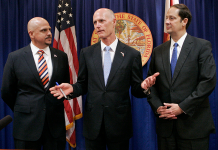Could Pot For Kids Be Coming To Florida?
In hopes that voters will eat up their predictions and reject the Bill, Vote No On 2 is warning that medical marijuana edibles will endanger children.
The anti-drug campaign recently released a flier that read, “Amendment 2 will bring kid-friendly pot candy to Florida.”
The campaign, ran by the Drug Free Florida Committee, started in 2014 by longtime GOP fundraiser Mel Sembler and his wife, Betty, with financial backing from casino magnate Sheldon Adelson.
Amendment 2 would let doctors recommend medical marijuana for patients with a host of medical conditions such as cancer, epilepsy, Parkinson’s disease and more. It only allows for a recommendation, because marijuana is still illegal under federal law, so doctors can’t prescribe it and pharmacists can’t distribute it.
Instead patients would take their recommendations to what is called a Medical Marijuana Treatment Center, which is regulated by the state to provide the drug.
The Amendment doesn’t specifically say candy anywhere in it, it does however say it allows edibles. There are arguments that edible forms of marijuana are better for some patients, because its effects are longer-lasting. But, it is difficult to gauge how the drug truly affects people when eaten instead of smoked.
The Vote No On 2 campaign has referenced children being hospitalized in many states for eating marijuana-laced candy, which appears tempting to children. The campaign also pointed out several stories of children in the medical marijuana states eating cookies, chocolate bars, brownies and other sweets and candies.

However, in some of the cases the campaign referred to it wasn’t apparent if the candy was medical marijuana or from some other source.
Ben Pollara, director of United for Care, the group behind the amendment, said Vote No On 2 was creating a “total dystopian fantasy about the way the amendment could be implemented.”
“Put it away,” he said. “That’s Parenting 101.”
The Amendment offers the state plenty of leeway on how it can regulate the marijunan industry. Washington, for example, bans products designed to appeal to kids. Connecticut requires tamper-resistant packages just like prescription drugs. California requires labels warning patients to keep products away from children. Then in New Jersey only allows edibles in lozenge form, which were previously only available to child patients to take at school.
Colorado was the first state to start selling medical marijuana in 2001 and recreational in 2012, has had an increase in children hospitalized sue to ingesting marijuana. This year the state banned some products shaped like people, fruit or animals.
The Journal of the American Medical Association published a study this year that looked into marijuana exposure in Colorado for kinds younger than 10. Between 2009 and 2015, children’s hospital visits increased from 1.2 to 2.3 per 100,000. The Washington Post said that meant hospitals and poison control centers are much more likely to get calls about diaper cream, toothpaste, laundry detergent and crayons than they are for marijuana.











